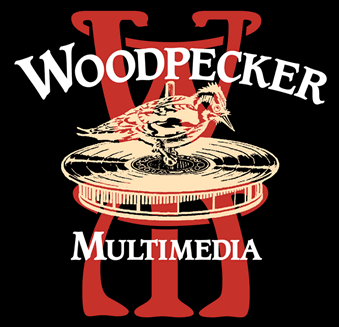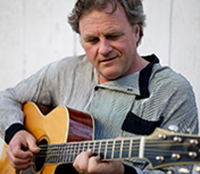 H
H

1999 Harvey Reid Interview With the Danbury CT News-Times© E. Kyle Minor, a freelance arts writer living in Connecticut) This is the complete, unabdidged, unedited version direct from the author. Feb 1999 There are those musicians who learn their craft from school and there are those who learn it on street corners, pubs and any other place they can draw an audience. Harvey Reid is definitely of the latter discipline. Reid, who performs next Saturday at North Country Music Series at St. Luke's Episcopal Church in Somers,N.Y. started out busking-street performing-in 1974. Today he is one of the most popular traditional acoustic musicians in New England. It may have taken him over 20 years to achieve that status, but as far as he's concerned, Reid is right on time. "Four or 5000 gigs adds up to a lot of string changes, dead batteries, snowstorms, gas receipts, fast food, bad coffee and blown fuses," he said from his home in York, Maine last week. "When I was young and strong and starting my career in 1974 the previous wave of 60's acoustic music was crumbling fast and Disco and video games the barbarian conquerors," he said. "Now that acoustic music is hip again, I am no longer young and cute. In a lot of ways I have been rowing upstream all my life." Of course there is a healthy positive side to Reid's road experiences, lest he chuck the whole thing to become, say a teacher. The multi-string instrumentalist counted hope as chief among the romantic aspects. "Many of the rewards of the artist life style are intangible or abstract," he said. "Financially, which is the way so many things are measured in our what-passes-for-culture, it is not a richly rewarding life, though the possibility of fame and riches always looms like a huge lottery ticket." Reid grew up in Maryland the fourth of six children in a "non-musical family." He confesses that his Scottish ancestry has steered him to Maine since its landscape resembles the British Isles. "Northern New England has long been home of a thriving blue-collar acoustic music circuit," he said, "where I played full-time and learned my trade for many years before touring nationwide. "One of my grandfathers was a Scottish gypsy who owned a circus and may have carried some genes I know nothing of, since I never met him," Reid said. "I quit college at 20 to become a street musician, and nothing I did before that time has had any particular bearing on my livelihood as an artist." Reid knew from the start that carving out a career is what is essentially bluegrass-folk music wouldn't be easy. He could've certainly made far more dollars playing fewer chords in a punk, rock or disco band. Reid had neither the ear nor the stomach for that. "The sound of the music has been the touchstone for me," he said. "The sound of strings vibrating on wood, and the singing voice, they way they are used in the various forms of traditional music have always deeply moved me and still do. "After a lot of years, many things we once think shiny can lose their luster," he said. "The sound of an old-time gospel duet where they are nailing the harmonies and the dynamics right on the money. Or a lilting fiddle tune, or a haunting ballad-- these things might even increase in beauty over one's lifetime. "I have no interest in spending my life designing contrived entertainment for the masses, and I am content to be an artist on the fringes of the culture," he said. "The largest concession I have made to the economics of it all is that it is not practical to have a band, and I have had to give that up to pursue an art form based on solo performances and playing styles. I truly love playing and singing with other people, and don't get to do it often enough." Reid's music doesn't fit squarely into the bluegrass genre, though it owes much of its sound to that style. He studied the roots of American acoustic music, especially the late, great Bill Monroe. "Monroe took the music that was around him in Rosine, Kentucky in 1930 or so, consisting of traditional fiddle and dance music, Protestant church music, some African-American blues and gospel, plus a smattering of Tin-Pan Alley, and passed it through his personality and his heart," Reid said. "Had he been born when I was born, he would have no doubt been influenced differently, as I have, and so I have chosen to take the music that is around me and do with it as I please, passing it through me first. "I play whatever of it I can do on my acoustic instruments," he said. "As information swirls more and more, and fewer people lead the isolated lives that bred certain definable forms of traditional music, we will see more and more young musicians playing cross-pollinated things, so you better get used to it. It is what young musicians do and have always done, and they will continue to do it, and should not be forced into marketing categories. "I play bouzouki because I have always loved the fiddle and the mandolin, and neither one works as a solo instrument very well," he explained. "Unlike some bouzouki players, I tune mine to octave mandolin tuning exactly, so the fingering and the geometry of the fretboard are the same as fiddle and mandolin. The lower pitch gives me enough resonance and sustains so I can use it to sing with like a guitar, and I can play tunes like a fiddler. "In spite of all the wonderful flatpick-style guitar that has been done, there still is no one that can generate, solo, a pulse and a rhythm flow the way you can with a fiddle," he said. "The bouzouki gets me closer to that place than I can get with my guitar." According to Reid, music, like many of the arts, is an immediate route to people's souls. "Music is sort of like doing brain surgery," he said. "People allow you to go inside them, and you can introduce thoughts and feelings that were not there, and modify ones that are. It is endlessly interesting and an honor to be allowed to do so. "I have also never had a job, and therefore have nothing to compare this to," he said. "If I knew how easy it would be to work only 40 hours a week for 20 years and to have my health and retirement and vacations paid for, I might not be able to do this. I've been working 80 hours a week for 25 years, with no end in sight. Most people, if their car breaks down on the way to work call in and are forgiven and take the time off work. When you have a concert booked and tickets sold and promotion paid for, there's a lot more at stake. "But I take it very seriously, and have never failed to make it to a show, and have never given an intentionally weak performance," he said. "There is so much other stuff you have to do, when you finally get to go on stage and play it is such a joy that the adversity melts away." Self-starter that he is, Reid created his own record label, Woodpecker Records in 1982-long before it became relatively easy with such technological advances as digital recording and dexterous computers. He has since released 13 solo recordings. "I have never been much of a fan of the music industry, and when my attempts to get a record label to sign me failed, I started my own" he said. "It is heartening to know that one can play and record one's music without chasing markets or making artistic compromises. Enough people are interested in what I do that I earn a modest living without paying attention to the trends. The good thing about owning his own label is that Reid doesn't have to worry about classifying himself-until his product reaches the retail rack. Then again, it's well out of his hands by that point. "I don't even technically play Bluegrass any more in my solo shows, though I am fully capable of it if I am in a band," he said. "There really isn't such a thing as solo Bluegrass, so I end up in the folk bin a lot. Bluegrass audiences tend to like me because I trained in their world, and I know how to play my instruments well, and I have both feet firmly in the traditions that preceded me. "I will probably aim my show more in a Bluegrass direction when I come to Somers," he said. "I see myself more as a modern version of the minstrels of old, and I see Bluegrass as one of the purest forms of tradition-based music that has evolved, most likely because of its lack of commercial success. It hasn't been polluted by the mainstream waters of big money, and musicians and fans are drawn to it for its own sake and do it in spite of the hard life style it requires. Much like I do, and not for the fame or money."
WOODPECKER MULTIMEDIA
|
